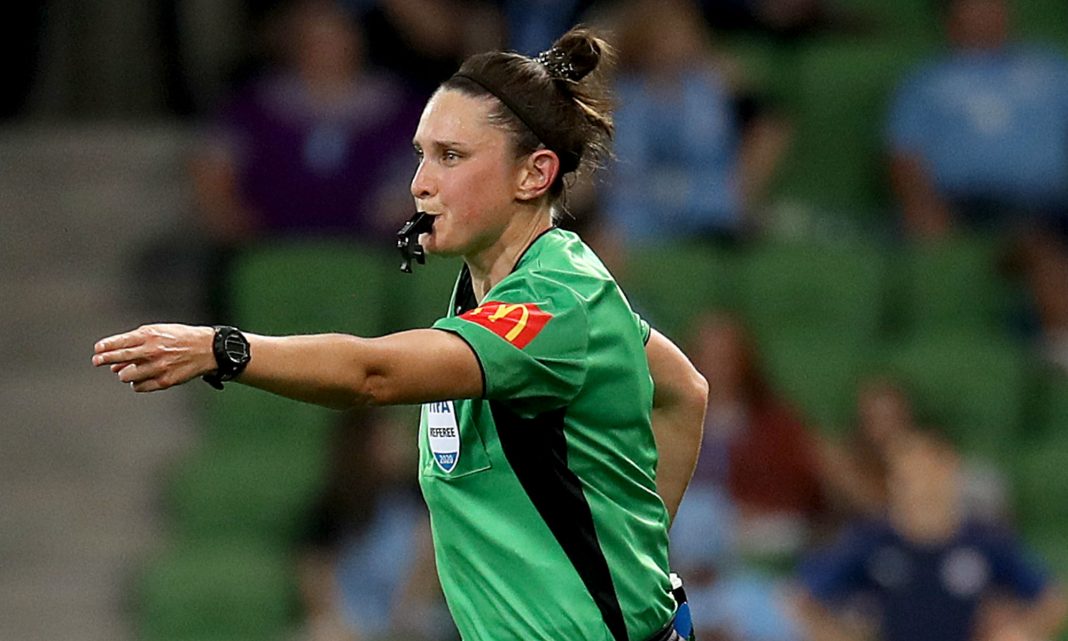
Technology can fail us, it did this week at Beyond 90 when chatting with Kate Jacewicz. So instead, here’s Molly’s rendition of how the podcast went.
Australian football reached a special milestone moment this weekend. Kate Jacewicz was in charge of the whistle as Melbourne City hosted Newcastle Jets, becoming the first woman to referee an A-League match from the centre.
One for the history books 📚👏#ALeague pic.twitter.com/0PheMYlCOr
— Isuzu UTE A-League (@aleaguemen) January 20, 2020
To talk about the occasion, Kate spent her Tuesday night answering numerous questions from Cheryl and Molly. The conversation was the kind to keep us (or at least Molly) on the edge of our seats with a massive smile for the whole 40 minutes.
The lead up to any occasion is just as important as the moment. While we’ve all seen Kate take centre stage in the W-League and at the Women’s World Cup, it’s the training, study and immersion in the game that often goes unseen, but very much happens.
Kate’s preparation leading into her first match wasn’t ideal a week out, with flight delays getting from Melbourne to Wellington, where she was the 4th official for the Phoenix v Western Sydney Wanderers A-League match. However, once on Australian soil it was business as usual for the referee. Training with A-League, W-League, Y-League and other Melbourne-based referees throughout the week, Kate did all the types of training familiar to football players, including fitness, speed and technical sessions. The battle with Melbourne’s smoke also factored into the week, restricting Kate and the referee group to training inside on the worst days of the haze.
Saturday was match day. Kate explained her decision to do the typical Melbourne thing of grabbing coffee and doing whatever she could to relax ahead of the match. With regards to the match itself, Kate couldn’t speak more highly of the players on the field and their professionalism. The high intensity of the match left little time for player management issues to flare up, and overall she appeared pretty happy, both with her ability to keep up with play and her positioning throughout the match.
One struggle Kate honestly admitted regarding her performance was her inability to see the handball in real-time. However, she explained that this type of situation is exactly the reason VAR is valuable in a match, as that incident fell into the category of a serious missed incident.
While on the topic of VAR, the Women’s World Cup naturally came up in the conversation. Kate credited the preparation FIFA provided for the new system, talking about the time spent on the field using the technology, alongside more desk-based sessions. The amount of training was estimated to be in excess of 100 hours, and she reflected on the emphasis of practical field learning as an area where Australian officials require greater exposure.
FIFA Women’s World Cup – Match officials appointed for the game #SWECAN (Round of 16), 24 June 2019, Paris
Ref: Kate JACEWICZ 🇦🇺
ARef 1: Kathryn NESBITT 🇺🇸
ARef 2: Felisha MARISCAL 🇺🇸
4th. Official: Sandra BRAZ 🇵🇹
VAR: Jose Maria SANCHEZ 🇪🇸@FIFAWWC pic.twitter.com/kEFdlq15X6— FIFA Media (@fifamedia) June 23, 2019
The question was thrown to her about the difference for a referee between the W-League, Women’s World Cup and the A-League, as Cheryl and Molly tried to gauge a comparison of the three. The reply was professionalism, and the way players react to decisions also fell in the answer. The gap between the three though? We were assured it’s not as much as we think, particularly in terms of the fitness and speed required of officials.
Molly had only just read the chapter in Never Say Die about how Kate has coached in her home state of Queensland, including some notable Matildas players, so she was chomping at the bit to ask how this experience impacts refereeing. Apparently it helps a lot. The understanding of how the game moves that comes from playing and coaching, along with the human element of knowing how emotions flare up during a match, are all experiences Kate says help her referee.
When asked about pointers for referees, trade secrets were revealed. The first was simple, but you can see it in any match where Kate referees – it’s to go on the field smiling and enjoy it. The other pointer is to back yourself and the decision made in the moment. In the same breath, to understand that you’re human, referees are human and mistakes will be made. When those mistakes are made, it’s ok to have a conversation with a player to the side of play and say that was probably a wrong decision, I’ll do better next time.
The Matildas won’t be the only ones involved in Olympic qualification, as Kate will head to Korea Republic’s Jeju Island to referee Group A matches. Whilst the road to referee in the Olympics isn’t as transparent as the Women’s World Cup, Kate remains hopeful, with fingers crossed she could be representing the AFC.
Closer to home, we asked what the next leap is to break down barriers and see more women involved in officiating A-League matches. Kate hopes to see more invested in women becoming VAR referees.